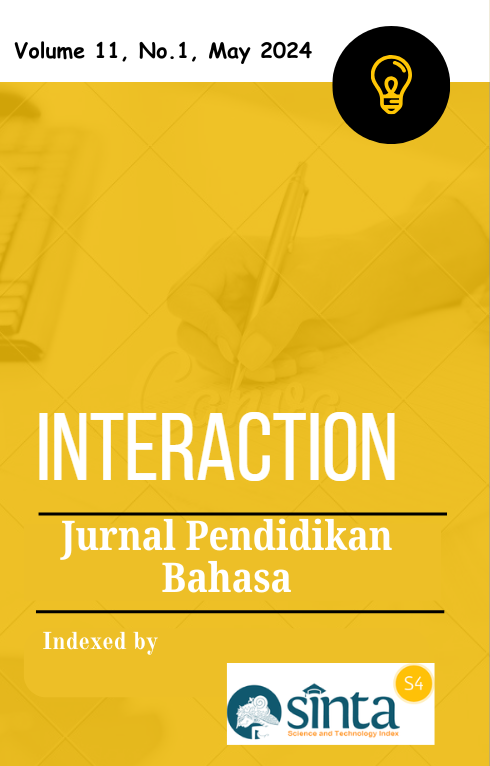The Effectiveness of the Pre-Reading Plan (PREP) Strategy in Enhancing Reading Comprehension: A Case Study of Eighth Grade Students at SMPN 3 Panca Rijang
Abstract
This study examines the effectiveness of the Pre-Reading Plan (PREP) strategy in enhancing reading comprehension among eighth-grade students at SMPN 3 Panca Rijang. Employing a pre-experimental design with a one-group pretest-posttest method, the research involved 20 students and one English teacher as participants. Data collection included pretests, posttests, and questionnaires, analyzed through qualitative and quantitative methods. Results indicated significant improvements in students' reading comprehension post-implementation of the PREP strategy, with the percentage of students meeting the minimum completeness criteria increasing from 35% to 70%. Additionally, students exhibited higher engagement levels during learning activities, and the teacher's performance in classroom management improved. Many students expressed a positive interest in the PREP strategy. These findings support the conclusion that the PREP strategy effectively enhances reading comprehension among students. It is recommended that the PREP strategy be adopted more widely to foster improved reading skills in English language learning contexts, as it encourages students to activate prior knowledge and engage more deeply with the reading material. Overall, this research highlights the importance of interactive and student-centered teaching strategies in improving reading comprehension and fostering a positive learning environment.
Downloads
References
Alharbi, S. (2022). The impact of vocabulary knowledge on EFL learners' reading comprehension. International Journal of Language and Linguistics, 9(1), 33-39. https://doi.org/10.11648/j.ijll.20220901.14
Chandavimol, P. (2023). Improving reading skills through pre-reading activities in EFL classrooms. Journal of Language Teaching and Research, 14(2), 154-161. https://doi.org/10.17507/jltr.1402.03
Cheung, H., & Sweeney, R. (2016). Exploring the effectiveness of pre-reading activities on EFL students' reading comprehension. Journal of Language and Education, 2(1), 51-63. https://doi.org/10.17323/jle.2016.64
Graves, M. F., Juel, C., & Graves, B. B. (2019). Teaching reading in the 21st century. Pearson Education.
Guo, J. (2019). The role of prior knowledge in reading comprehension: Evidence from cognitive science. Cognitive Development, 50, 57-67. https://doi.org/10.1016/j.cogdev.2018.09.002
Khaiyali, M. A. (2023). The effects of pre-reading activities on EFL learners’ reading comprehension performance. Journal of Language Teaching and Research, 14(3), 454-460. https://doi.org/10.17507/jltr.1403.05.
Langer, J. A. (2018). Reading comprehension: Theoretical perspectives and practical applications. Journal of Reading Behavior, 50(4), 408-429. https://doi.org/10.1002/trtr.1734
Li, M. (2020). Enhancing EFL students' reading comprehension through pre-reading strategies: A case study. Asian EFL Journal, 27(2), 45-61. https://doi.org/10.2139/ssrn.3542505
Lutz, W., & Duffy, G. (2017). Engaging students in reading through pre-reading strategies: A systematic review. Reading Psychology, 38(6), 603-628. https://doi.org/10.1080/02702711.2017.1344134
Mohamed, A. (2021). The effectiveness of interactive pre-reading strategies on EFL students’ reading comprehension. English Language Teaching, 14(1), 45-56. https://doi.org/10.5539/elt.v14n1p45
Murdoch, J., & Yeo, A. (2018). A study of pre-reading strategies in improving comprehension skills of EFL students. International Journal of Linguistics, 10(4), 88-100. https://doi.org/10.5296/ijl.v10i4.14262
Nabhan, A., & Arshad, M. (2020). Impact of pre-reading activities on reading comprehension skills: A meta-analysis. International Journal of Educational Research Review, 5(2), 156-168. https://doi.org/10.24331/ijere.680161
Nuttall, C. (2020). Teaching reading skills in a foreign language. Educational Research for Policy and Practice, 19(1), 1-15. https://doi.org/10.1007/s10671-019-09250-x
Oxford, R., & Shearin, J. (2019). Language learning motivation: Expanding the theoretical framework. The Modern Language Journal, 103(3), 486-504. https://doi.org/10.1111/modl.12523
Pandawa, N. H., Hairudin, S., & Mislinatul, S. (2016). Pembelajaran membaca: Strategi efektif untuk meningkatkan pemahaman bacaan. Jurnal Pendidikan Bahasa dan Sastra, 17(1), 55-66.
Saepudin, E. (2023). The role of pre-reading strategies in enhancing reading comprehension skills among EFL learners. Indonesian Journal of Applied Linguistics, 13(1), 12-20. https://doi.org/10.17509/ijal.v13i1.4576
Shabaz, M., Khan, M. A., & Mahmood, N. (2023). Challenges in EFL reading comprehension: A study of eighth graders. International Journal of English Linguistics, 13(3), 45-58. https://doi.org/10.5539/ijel.v13n3p45
Sinambela, N. J. M. (2018). Factors influencing the effectiveness of reading comprehension strategies. Journal of Education and Practice, 9(1), 50-58.
Thongyon, P., & Chiramanee, T. (2022). The effects of pre-reading activities on reading comprehension ability. Prince of Songkla University Journal, 10(1), 57-70.
Tseng, Y. H. (2021). The influence of reading strategies on EFL learners' reading comprehension: A case study of Taiwanese university students. The Asia-Pacific Education Researcher, 30(3), 299-310. https://doi.org/10.1007/s40299-021-00575-1
Ur, P. (2016). A course in language teaching: Practice and theory. Cambridge University Press.
Wang, X. (2019). The impact of pre-reading strategies on reading comprehension in an EFL context. Journal of Educational Psychology, 111(3), 408-419. https://doi.org/10.1037/edu0000326
Williams, E. (2017). Reading in the language classroom. Language Learning Journal, 45(3), 291-307. https://doi.org/10.1080/09571736.2017.1304531
Zhang, L. (2020). Metacognitive strategy use and EFL reading comprehension: An investigation of Chinese university learners. The Electronic Journal for English as a Second Language, 24(2), 1-16. https://doi.org/10.5555/1718392
Zwiers, J. (2018). Building academic language: Essential practices for content classrooms grades 5-12. Jossey-Bass.




.png)



22.png)
